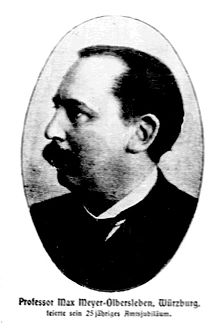Max Meyer-Olbersleben

Max Meyer-Olbersleben (born April 5, 1850 in Olbersleben , † December 31, 1927 in Würzburg ) was a German composer and pianist .
Life
Meyer-Olbersleben studied with Carl Müllerhartung and Franz Liszt at the Weimar Orchestra School and with Josef Gabriel Rheinberger , Franz Wüllner and Peter Cornelius at the Royal Music School.
After graduating, he became a lecturer in piano and theory in Weimar. Later he was professor for counterpoint and composition at the Bavarian State Conservatory of Music in Würzburg, whose director he was from 1907 to 1920. His students included Adolf Sandberger , Heinrich Steinbeck , Bernard Homola , Ludwig Müller ("Waldmüller") , and Marc Roland . In addition, from 1879 on he directed the Würzburg Liedertafel, which was formed in 1842 from several predecessor organizations . Since 1898 he was a board member of the German Singers Association . In 1914 he received the title of Hofrat . He was court conductor of the Würzburg bishop .
Meyer-Olbersleben was best known as a composer of songs and choral works , and some of his chamber music works are still performed today.
His children are Max, Hildegard, Vera (singer and music teacher) and Ernst Meyerolbersleben (composer).
Works
- Gothen-Treue for male choir and orchestra op.45 (Text: Felix Dahn )
Web links
- Literature by and about Max Meyer-Olbersleben in the catalog of the German National Library
Individual evidence
- ^ Sybille Grübel: Timeline of the history of the city from 1814-2006. In: Ulrich Wagner (Hrsg.): History of the city of Würzburg. 4 volumes, Volume I-III / 2, Theiss, Stuttgart 2001-2007; III / 1–2: From the transition to Bavaria to the 21st century. Volume 2, 2007, ISBN 978-3-8062-1478-9 , pp. 1225-1247; here: p. 1228.
| personal data | |
|---|---|
| SURNAME | Meyer-Olbersleben, Max |
| BRIEF DESCRIPTION | German composer |
| DATE OF BIRTH | April 5, 1850 |
| PLACE OF BIRTH | Olbersleben |
| DATE OF DEATH | December 31, 1927 |
| Place of death | Wurzburg |
